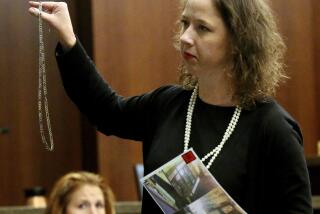Prosecution of Drug Money Case Criticized : Courts: A judge has faulted an assistant U.S. attorney’s actions. The lawyer says he has no animosity against the defendants.
Federal prosecutors have won 26 convictions of former sheriff’s deputies for skimming of drug monies while serving in elite anti-narcotics units. But so far they have not succeeded in convicting a former Los Angeles police officer who worked with them, Stephen Polak, or his former wife, onetime Deputy Christina Townley.
In fact, it is the prosecutors from the U.S. attorney’s office who have been thrown on the defensive while going after Townley and Polak.
First, in July, there was a caustically worded dismissal of an indictment against Townley by normally mild-mannered U.S. District Judge Robert M. Takasugi.
Takasugi did not mince words, calling the prosecutors “callous, coercive and vindictive,” accusing them of going after Townley only because she would not cooperate with them, and saying the U.S. attorney’s office “used threats, deceit and harassment techniques to compel her to cooperate.”
So, he said, he was granting a defense motion to dismiss the case for “vindictive prosecution.” And he mentioned assistant U.S. Atty. Mark A. Byrne, chastising him for exhibiting personal anger toward the defendant or defense counsel in his conduct of the Townley case.
A few weeks later, prosecutors failed to secure a conviction against Polak, who was accused along with his former wife of failing to report illicit taking of drug monies on tax returns.
The jury was deadlocked 9 to 3 for acquittal of Polak. After the verdict, several jurors chastised Byrne, the prosecutor who handled the case. They complained that his lead witness against Polak was a former deputy, Sgt. Robert R. Sobel, who alienated the jurors with his testimony.
The jurors, several of whom were black, said they were put off when Sobel testified--in response to attorneys’ questions--that he had been involved frequently in the arrest of blacks who were simply walking the streets and were innocent of any crime, and that more than 100 times he had lied in court testimony. He also told of overtures he had made to Townley while she was married to Polak.
The U.S. attorney’s office moved for reconsideration of the dismissal of the indictment of Townley, asserting that Byrne had failed to present compelling evidence and that the prosecution had not been vindictive. But Takasugi was unmoved, saying it was too late to present new evidence.
Prosecutors will reveal on Sept. 19 whether they intend to retry Polak.
In a lengthy interview, Byrne, accompanied by George Newhouse, a supervisor in the U.S. attorney’s office, insisted that his prosecutorial conduct in both cases had been proper.
The decision to prosecute Townley was a collective one in which senior members of the U.S. attorney’s office had concurred, he said.
Byrne said Sobel was the only witness who could provide direct testimony that Polak “was a bad cop,” and establish the foundation for the tax charge.
Sobel, he noted, had testified in eight of the drug money skimming cases, and had assisted in obtaining convictions in many of them.
“I have no personal animosity toward either of these defendants,” Byrne added. “Our decision to prosecute is because there is evidence against them.”
Byrne said he had been so shocked at Takasugi’s July 18 language when he dismissed the Townley case that “I didn’t remember what he said five minutes later. I blotted it out.”
Newhouse said this explained to his satisfaction why Byrne told The Times that same afternoon that he did not recollect Takasugi using words such as callous and coercive about the prosecution, when Townley’s defense attorney, Michael Nasatir, said he remembered those precise terms.
An official transcript later confirmed that Nasatir’s recollection was correct.
On July 28, in testimony seeking reconsideration by Takasugi of the Townley indictment dismissal, Richard E. Drooyan, chief of the U.S. attorney’s office’s criminal division, was critical of Byrne.
But Drooyan said Byrne “did exactly what was expected of him in analyzing the evidence and presenting the case (to his supervisors) on whether or not to seek an indictment.”
As for Takasugi’s strong language, Drooyan called it “a very important matter, not just to Mr. Byrne, but to the United States attorney’s office.”
Takasugi responded later that he was “certainly not proud” of the language he had used, but he added: “The court made a ruling . . . based on the evidence presented to the court. Both sides had an opportunity to augment the record with additional facts, additional law. It was not done.”
More to Read
Sign up for Essential California
The most important California stories and recommendations in your inbox every morning.
You may occasionally receive promotional content from the Los Angeles Times.










